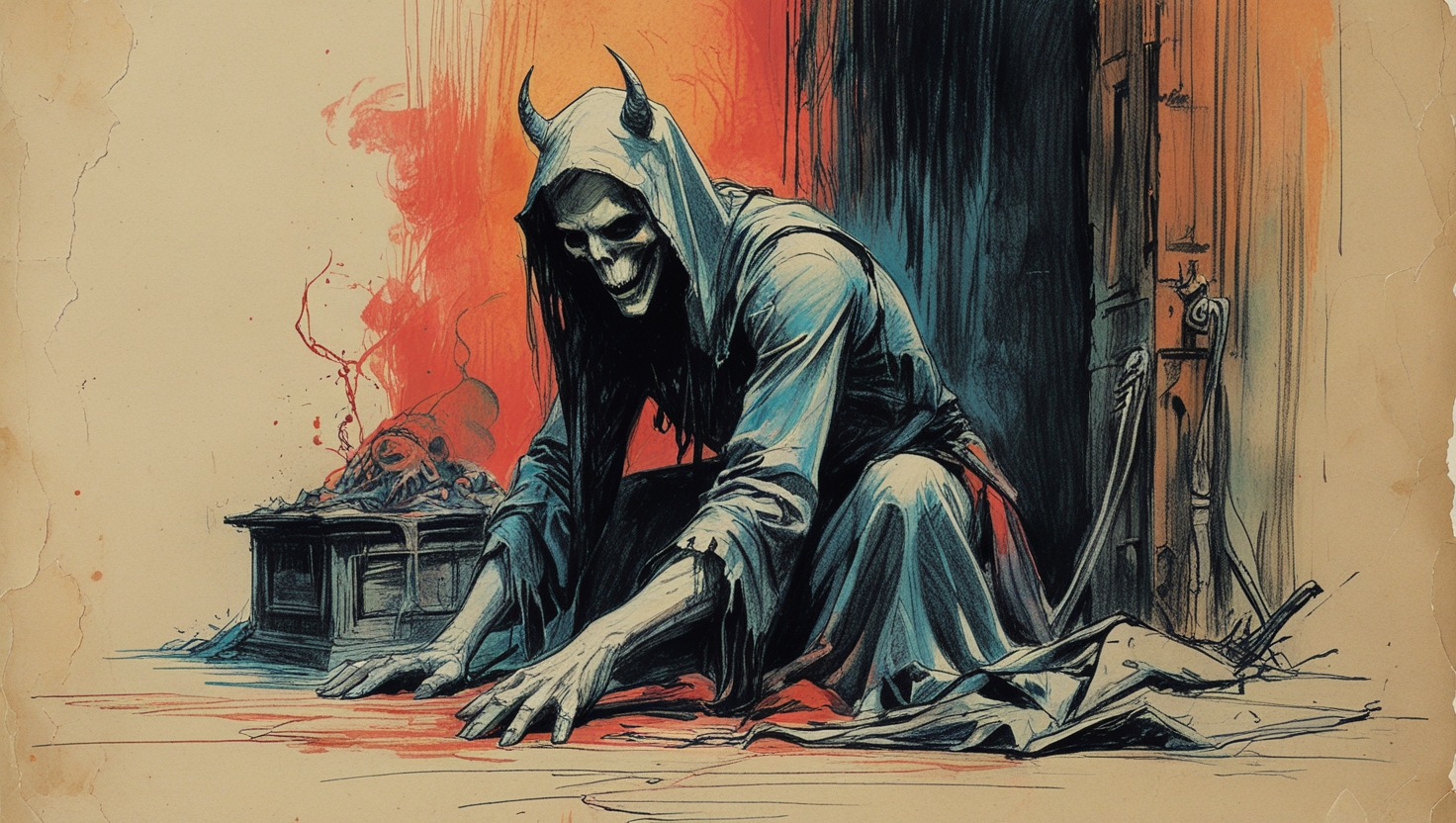„N.I.B.“, from Black Sabbath’s self-titled 1970 debut album, is a dark, seductive, and unconventional love song told from the perspective of Lucifer himself. Featuring one of Geezer Butler’s most iconic basslines, heavy blues-inspired riffing by Tony Iommi, and Ozzy Osbourne’s sinister yet emotional vocals, the song is a prime example of early heavy metal’s fascination with occult themes, forbidden love, and dark mythology.
The lyrics portray Lucifer not as a force of pure evil, but as a romantic figure who experiences love and devotion, offering a unique twist on the traditional image of Satan in rock and metal. This subversion of expectations, combined with the song’s hypnotic groove and doom-laden atmosphere, makes N.I.B. one of the most compelling tracks from Black Sabbath’s early catalog.
Overview
Unlike many songs that depict Satan as an antagonist or malevolent force, N.I.B. presents him as a tragic, almost sympathetic figure who has fallen in love and seeks redemption through devotion. The song is structured as a first-person confession from Lucifer, where he expresses his passion for a mortal and offers power, eternity, and a new life in exchange for their love.
Musically, the song features a signature heavy blues groove, enhanced by a menacing yet infectious bassline, which serves as the backbone of the track. The lyrics, combined with Ozzy’s impassioned delivery, make this one of the most seductive and sinister love songs in metal history.
Narrative Structure
- Intro: The Iconic Bassline (Geezer Butler’s Moment)
- The song opens with a legendary bass solo by Geezer Butler, drenched in a thick, distorted wah effect, giving it an ominous, hypnotic quality.
- This intro builds tension before Iommi’s massive, blues-driven riff kicks in, setting the stage for Lucifer’s confession.
- Verse 1: Lucifer’s Declaration of Love
- The song immediately subverts expectations by presenting Lucifer as a passionate, almost desperate lover rather than a malevolent force.
- Lines like “Some people say my love cannot be true” suggest that the world perceives him as incapable of genuine emotion.
- He pleads for trust, offering loyalty, devotion, and even immortality in return for love.
- Verse 2: The Temptation & The Promise of Power
- Lucifer entices the listener (or his beloved) with promises of eternal life and supernatural gifts.
- He declares, “Now I have you with me, under my power”, suggesting that the mortal has already succumbed to his influence.
- The language is seductive rather than threatening, reinforcing the idea of Lucifer as a romantic antihero rather than a villain.
- Verse 3: The Ultimate Transformation
- The song reaches its climax as Lucifer fully convinces his lover to accept his embrace.
- The line “Look into my eyes, you’ll see who I am” suggests a moment of revelation, where his beloved understands his true nature.
- The final lines, “Your love for me has just got to be real,” emphasize his desire for genuine, mutual devotion, reinforcing the idea that even the Prince of Darkness is capable of love.
- Outro: The Doom-Laden Fade-Out
- The song ends with its heavy, rolling riff repeating, creating a hypnotic, almost ritualistic effect.
- The dark blues groove and slow, sludgy atmosphere give the impression that the listener has been pulled deeper into Lucifer’s grasp.
Themes & Symbolism
- Lucifer as a Romantic Antihero
- Instead of being the traditional symbol of evil, Lucifer is presented as a misunderstood, lovestruck figure seeking acceptance.
- This interpretation aligns with 19th-century Romantic depictions of Satan, such as in Milton’s Paradise Lost, where he is portrayed as a tragic, rebellious figure rather than a pure force of destruction.
- The Allure of Darkness & Forbidden Love
- The song plays on the classic “deal with the devil” trope, but instead of offering power in exchange for a soul, Lucifer offers eternal love.
- This creates a moral ambiguity—is the love genuine, or is it a deception?
- It also reflects the human fascination with darkness, rebellion, and the forbidden.
- Power & Transformation
- Lucifer offers immortality, power, and devotion, suggesting that his love is transformative, elevating his beloved to something beyond human.
- The reference to “Now I have you with me under my power” implies a moment of surrender and transcendence, where the mortal fully embraces the darkness.
- Occult & Mysticism
- The song plays with occult imagery, but instead of being overtly Satanic, it uses seductive, poetic language to create a mystical atmosphere.
- This theme would later become a major influence on doom metal, stoner rock, and occult rock bands.
Musical & Emotional Impact
- Iconic Bass-Driven Groove
- Geezer Butler’s distorted, wah-heavy bass intro is one of the most recognizable openings in metal history.
- It sets the mood for dark seduction and hypnotic doom.
- Heavy Blues Riffing & Psychedelic Vibes
- Tony Iommi’s slow, groovy, blues-infused riffing gives the song a hypnotic, trance-like feel, reinforcing the seductive nature of the lyrics.
- The mid-tempo groove makes the song both heavy and infectious, perfect for the ritualistic, seductive tone of Lucifer’s words.
- Ozzy’s Haunting Yet Emotional Vocals
- Ozzy delivers the lyrics with a mix of menace and desperation, making Lucifer sound both powerful and vulnerable.
- This performance adds to the tragic yet seductive quality of the song.
Legacy & Reception
- A Cult Classic in Black Sabbath’s Catalog
- N.I.B. has remained one of Sabbath’s most celebrated songs, often featured in greatest metal song lists.
- It is a staple of their live performances, with its groovy, doom-laden atmosphere making it a fan favorite.
- Influence on Doom Metal & Occult Rock
- Bands like Electric Wizard, Candlemass, and Ghost have cited N.I.B. as an influence in blending dark, mystical themes with heavy blues and doom riffs.
- Its occult-laced storytelling and slow, heavy groove became a blueprint for doom and stoner metal.
- Misconceptions About the Title
- Many fans assumed that N.I.B. stood for „Nativity in Black“, reinforcing the idea that the song was about Satan’s origin.
- However, Geezer Butler later clarified that the title was simply a reference to drummer Bill Ward’s beard, which resembled a pen nib.
- Despite this mundane origin, the title has taken on a life of its own, adding to the song’s mystique.
Final Verdict
„N.I.B.“ is a masterpiece of early heavy metal storytelling, presenting Lucifer not as a villain, but as a tragic figure of love and seduction. With its hypnotic bass intro, bluesy doom riffs, and haunting lyrics, it remains one of Black Sabbath’s most iconic songs.
Its dark romanticism, occult mystique, and heavy groove ensure its place as a cornerstone of heavy metal history, influencing doom metal, stoner rock, and countless occult-themed bands for generations to come.



